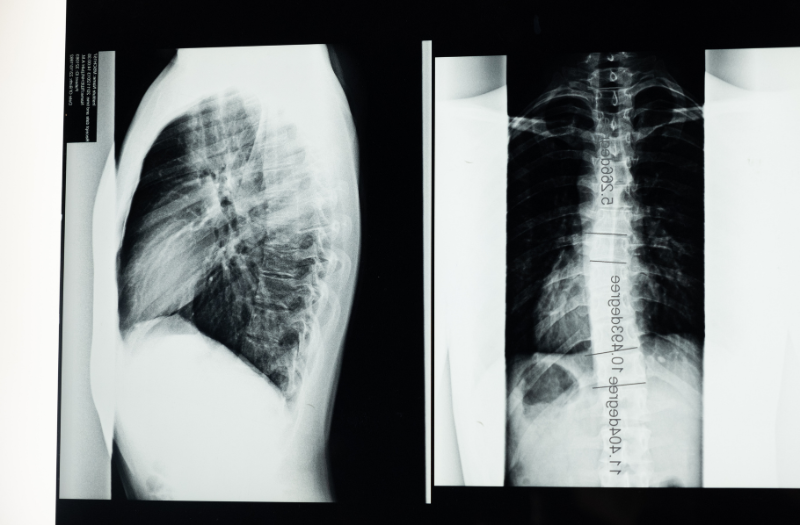Scoliosis most often appears during childhood or adolescence, but it can also develop in adults. In adults, one of the main problems it causes is back pain. In this article, Dr. Charosky explains whether adult scoliosis can be corrected.
Scoliosis is a three-dimensional deformation of the spine. The human spine has a natural forward and backward curve. In scoliosis, however, the spine rotates and develops a curve in the frontal plane, which can be mild (about 20 degrees), moderate (between 25 and 40 degrees), or severe (50 degrees or more).
Scoliosis is usually discovered in young people or adolescents while they are growing, and is known as idiopathic scoliosis. When scoliosis is diagnosed after a patient is fully grown, it is called adult scoliosis because the skeleton’s growth is complete. Degenerative scoliosis is the kind that appears in adults who had a normal spine and develop new-onset scoliosis with the degenerative changes of old age.
Most cases of scoliosis are mild and do not need treatment. With scoliosis in adults, the degree of spinal curvature may or may not be the determining factor for treatment. Treatment is usually aimed at relieving symptoms and not necessarily correcting the curve. The goal is always to minimize pain and improve the patient's quality of life.
At Instituto Clavel we have a Scoliosis Department staffed by neurosurgeons, orthopedic surgeons, and traumatologists. Dr. Sebastien Charosky, heads this department, and he and his team are dedicated to providing the most appropriate treatment for each individual patient.
Discover more about the Scoliosis Department at Instituto Clavel
Types of adult scoliosis
- Adult idiopathic scoliosis: This refers to scoliosis that was already present during the persons growth period but was not detected until after the skeleton was fully matured. In terms of type of curve and shape, it has the characteristics of adolescent scoliosis. However, unlike in adolescents, this type of scoliosis in adults can be accompanied by degenerative elements and symptoms such as pain.
- Degenerative or "new onset " scoliosis: This kind of scoliosis appears in adulthood and is the product of the ageing of the structures of the spine (intervertebral discs, muscles, vertebrae). The shapes of the deformity are different from adult idiopathic scoliosis. This type also has characteristic symptoms, such as pain and spinal imbalance.

Correcting scoliosis in adults
Adults seek medical attention for both types of scoliosis, but as human life expectancy has increased, we see more and more patients who used to have normal spines, and developed scoliosis due to the degenerative changes of age. There has been a considerable increase in consultations for this for this condition over the last 10 years.
With regard to treatment options for adults diagnosed with scoliosis, the patient’s age and state of health, the degree of curvature, and the spinal balance are some of the main factors to consider. Fortunately, in most cases, this pathology does not require surgery, because a treatment plan including measures such as pain relief medication, epidural infiltrations, and specific physical therapy can be enough to relieve the patient’s back pain.
When conservative treatments are not sufficient, or when the patient has a pronounced spinal imbalance, surgery may be considered. Correction of deformity in adults is a complex surgery that entails risks. Each patient should be evaluated in a personalized and individual way.
In recent years, this type of surgery has greatly benefitted from new techniques. Current technology allows us to plan the surgery and even predict the results before it is performed, by using specialized software and designing implants that are custom fit to the patient. We also employ state-of-the-art imaging studies, such as the EOSedge scanner, with which we can perform an analysis of all the angles and shapes of scoliosis. This is what Dr. Charosky talks about in the following article:
 “Scoliosis surgery is undergoing a revolution”
“Scoliosis surgery is undergoing a revolution”
At Instituto Clavel, we were the first center to use custom-fitted rods in scoliosis surgery. Our surgery is also made safer with the neurophysiological monitoring system we use to oversee the safety of the nerves and spinal cord during the surgery.
Including the latest technologies and robotics is part of the way we work, as well as the care, treatment and follow-up by the IC Rehabilitation team once the surgery is over.
Don’t hesitate to contact us for further consultation.
Categories: Spine pathologies, Surgery, Back pain
